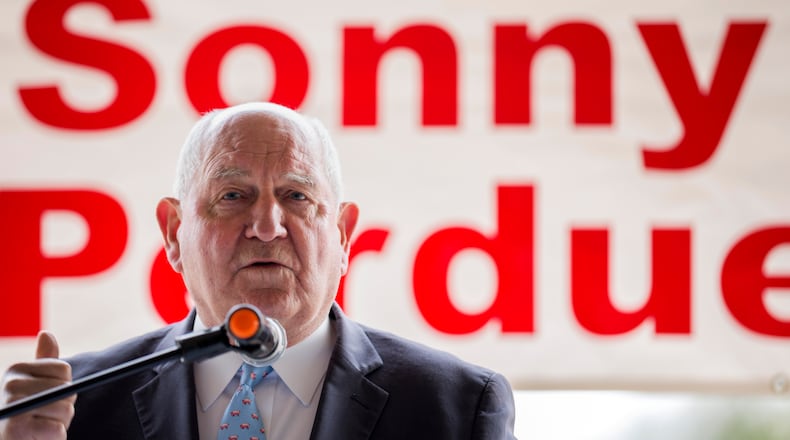Those championing Sonny Perdue as the next chancellor tout his skills as a manager, citing the recognition of Georgia as among America’s best-run states during his tenure as governor. The politically appointed Board of Regents approved Perdue as sole finalist for job earlier this month and may finalize that decision early next week.
The problem is the University System of Georgia requires more than a competent manager. It needs a visionary leader who can not only manage the 26 colleges and universities but continue their upward arc toward excellence, who understands the historical role of public universities as engines of societal advancement and the need to prioritize teaching and research.
Excellence won’t be attained or maintained by a chancellor whose only stated goal thus far is reasserting conservative values. The chancellor oversees policy decisions and curriculum development, plans for the future of the University System and, as former University of Colorado System President E. Gordon Gee said, “keeps open the door to the American dream.”
To meet Georgia’s urgent workforce needs, the door needs to swing wider so more students from historically underrepresented groups can enter and succeed. Today, 31.3% of Georgians hold an bachelor’s degree or above. Yet, by 2025, 60% of jobs will require postsecondary education.
Georgians who yearn for a return to conservative or traditional values often mean a retreat to the ways things were a generation or more ago. In 1980, eight out of 10 students in the state’s public campuses were white. Black students represented 15% of the total enrollment of 126,807, while Latino and Asian students were barely a blip, at around 1% each.
Today, the University System of Georgia serves 340,638 students and is more racially diverse than any period in its history. At 46%, white students now represent less than half of the enrollment, while Black students account for 25.75% and Latinos and Asians are each above 10%. Many of the students are from lower income families and cannot count on college savings accounts.
The Governor’s Office of Planning and Budget predicts Georgia will be a majority non-white state by 2029. The state’s economic growth and future will depend on drawing talented students who are not necessarily white or conservative to our colleges.
Is Perdue, whose most recent job was secretary of agriculture in the Trump administration, the leader for the increasingly diverse face of Georgia’s colleges? Those students will not feel safe or welcome if Perdue caters to those who regard diversity, equity and inclusion as an unholy trinity and contend institutional racism doesn’t exist and shouldn’t be discussed in classrooms.
Perdue’s pledge to shore up conservative values reflects a troubling fealty to political agendas rather than educational excellence. In 2003, Perdue introduced the term “austerity cuts” into Georgia education parlance; these deep cuts in K-12 funding have occurred in the state budget 18 of the last 20 years. Perdue began his first term as governor promising to create a fairer way to fund Georgia schools. But after 75 public meetings and discussions with 105 school systems, Perdue’s Education Finance Task Force ended up recommending only greater spending flexibility to systems that meet higher academic bars.
His lack of significant impact on K-12 education as governor doesn’t mean Perdue couldn’t run the University System. Perdue can be decisive and he can recognize talent, appointing the much-respected former DeKalb school board chair and state Board of Education member Brad Bryant to helm the state Department of Education after Superintendent Kathy Cox resigned in 2010 to assume leadership of a Washington think tank.
The Board of Regents provides a checklist of qualities a chancellor ought to have. A longtime politician, Perdue clearly meets the third item on the list-- the ability to represent the University System to the Legislature. However, critics maintain he falls short on the second requirement: Credentials sufficient to earn the respect of the university community.
The American Association of University Professors criticized Perdue’s selection, noting he lacks experience in higher education leadership. Students, too, have protested Perdue’s selection as the lone finalist for the chancellor’s job. The Students Against Sonny petition on Change.org collected 1,542 signatures; the Students for Sonny petition drew 98.
Perdue is not noted for a collaborative approach, but he can’t further the eminence of Georgia’s public colleges and universities without eminent faculty. In the fall, the Board of Regents alienated the academic community by diluting tenure protections. During the worst of COVID-19 when most of its peer systems nationwide required masks, the University System of Georgia ignored science and capitulated to politics, ordering professors back into classrooms without the option to require masks of their students. The priority was not staff and students, but Gov. Brian Kemp, who didn’t want to rile voters who opposed mask mandates.
Kemp’s political strategizing and new appointments to the Board of Regents led to Perdue’s emergence as the sole finalist, and it’s likely the former governor appreciates that Kemp has given him the final chapter he sought. But Perdue’s gratitude should not equal acquiescence. Perdue’s allegiance must be to the students, who look and act differently than when he finished his veterinary medicine degree 51 years ago.
In setting his course, Perdue ought to study another governor turned chancellor. Former Arizona Gov. Janet Napolitano, who, too, served in a presidential cabinet as Barack Obama’s Secretary of Homeland Security, led the academically renowned University of California system for seven years. She recognized public campuses define the states they serve and play a critical role, saying, “This country’s public universities and colleges foster an active, thinking citizenry. They enhance public spirit. They educate — and more importantly, elevate — vast numbers of young people. These are public goods that work for the public good; they deserve the stewardship that public goods demand, and that the young people of this country deserve.”
About the Author
The Latest
Featured



